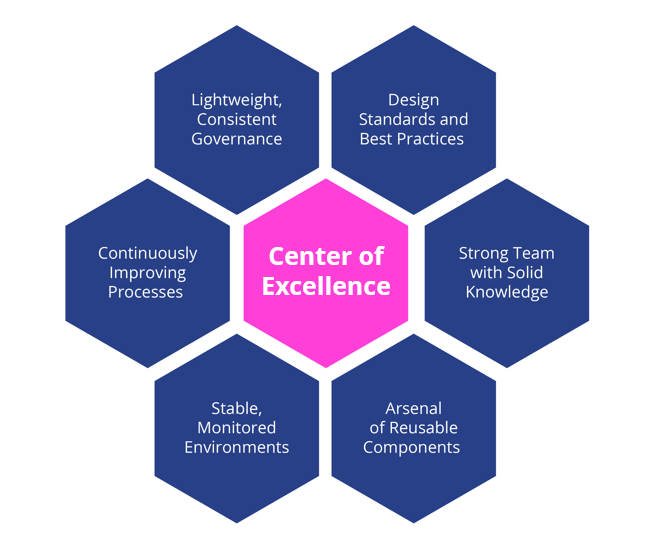6 Reasons to Build an Automation CoE
- 1 6 Best Reasons to Build an Automation CoE
- 1.1 Enhanced efficiency and productivity
- 1.2 Cost-efficiency and enhanced ROI
- 1.3 Elevated precision and enhanced quality
- 1.4 Strengthened adherence to regulations
- 1.5 Elevated agility and innovation
- 1.6 Enhanced customer experience
- 2 Implementing an Automation Center of Excellence
- 3 Summary
Businesses worldwide have enthusiastically embraced efforts to accelerate their automation initiatives due to the transformative potential of intelligent automation in transitioning businesses from cumbersome and error-prone operations to streamlined and agile processes. The integration of automation and its benefits becomes paramount for large-scale enterprises. An automation center of excellence (CoE) emerges as a potent asset for enterprises seeking to optimize their workflows, reduce expenses, and improve operational efficiency.
Through the strategic utilization of automation tools like robotic process automation, artificial intelligence, and machine learning, businesses can effectively automate an extensive scope of tasks and processes, ranging from straightforward data entry to intricate decision-making procedures.
An automation CoE can empower businesses to thrive in the era of digitalization by improving planning and optimizing processes at scale. Let’s delve into the six advantages that businesses can attain by establishing an automation CoE.
6 Best Reasons to Build an Automation CoE
Enhanced efficiency and productivity
The implementation of automation CoE has the potential to substantially enhance efficiency and productivity by minimizing the time and energy necessary for task completion. Through automation, employees can execute repetitive tasks that consume significant time with heightened speed and precision. Consequently, employees can allocate their efforts to more strategic responsibilities demanding human skills, ultimately amplifying productivity and fostering favorable business outcomes. Furthermore, automation contributes to refining workflows and collaboration by simplifying procedures and ensuring consistent communication among teams.
Cost-efficiency and enhanced ROI
Through process automation, enterprises can achieve noticeable cost reductions and elevate their return on investment (ROI). For instance, automation of manual tasks like expense reporting, data entry, and invoice processing can cut manual labor time and enhance processing speed, consequently yielding noteworthy cost savings. Furthermore, automation has the potential to eliminate errors, leading to additional expense reductions. Businesses can experience a greater return on investment in their automation endeavors as their efficiency and productivity get improved while errors are minimized.
Elevated precision and enhanced quality
The introduction of automation can enhance the precision and caliber of processes by mitigating the likelihood of human errors. It guarantees consistent and precise execution of tasks, mitigating the possibility of inaccuracies often associated with manual procedures. This is specifically beneficial for tasks demanding a greater level of precision, such as financial reporting or compliance processes.
Strengthened adherence to regulations
By ensuring the uniform and compliant execution of processes in alignment with regulatory mandates, automation can enhance regulation compliance and risk management. Moreover, it facilitates the creation of a comprehensive audit trail detailing process stages, simplifying the identification and resolution of compliance-related issues. By reducing errors and fostering consistent adherence to policies and regulations, enterprises can mitigate their exposure to risks and enhance their compliance stance.
Elevated agility and innovation
The integration of automation equips businesses with heightened agility and a platform for innovation, streamlining operations, and expediting decision-making. Through the automation of routine tasks, employees are liberated to focus on strategic endeavors such as product development, engaging with customers, and fostering innovation. Additionally, automation facilitates expedited decision-making by furnishing real-time data and insights, ultimately empowering enterprises to swiftly respond to evolving market dynamics and customer demands.
Enhanced customer experience
Automation can enhance the overall customer experience by optimizing processes and delivering quicker and more precise responses to customer inquiries. For instance, automating customer service inquiries can decrease waiting times while boosting the accuracy and consistency of responses. Similarly, the automation of order fulfillment and delivery processes can expedite shipping and improve accuracy, thus elevating customer satisfaction levels. By enabling a seamless and efficient customer experience, businesses can cultivate customer loyalty and foster recurring revenue.
Implementing an Automation Center of Excellence
The successful implementation of an automation CoE demands thorough planning and execution. Here are key considerations for businesses aspiring to establish an automation CoE:
- Identify automation opportunities: Businesses should pinpoint areas where automation can yield the most substantial benefits, potentially including repetitive tasks or tasks susceptible to errors.
- Establish objectives and metrics: Clearly defined objectives and key performance indicators (KPIs) should be established for the automation endeavors. These metrics will facilitate the evaluation of the CoE’s effectiveness and track its progress over time.
- Construct a governance framework: A robust governance structure is essential for the automation of CoE. This could entail a steering committee, a project management office, and a set of guidelines and standards for managing automation projects.
- Form a cross-functional team: The automation CoE should be staffed with a team comprising diverse expertise, spanning automation, process enhancement, and project management. Collaborating closely with various business units, this team can discover automation possibilities.
- Select appropriate technology: The choice of technology is pivotal for successful automation initiatives. Options such as robotic process automation, artificial intelligence, and machine learning technologies should align with the organization’s needs.
- Provide training and support: Equipping employees with the necessary skills and knowledge to effectively engage with automation technologies is crucial. Offering comprehensive training and ongoing support ensures a smooth transition.
Summary
By instituting an automation CoE, businesses can streamline their automation strategies, cut expenses, enhance process excellence, and better navigate risks. Ultimately, this paves the way for improved competitiveness, innovation, and financial performance. Given the growing significance of automation in the modern digital landscape, an automation CoE stands as an indispensable asset for businesses aiming to drive prosperity and advancement in the years to come.


















